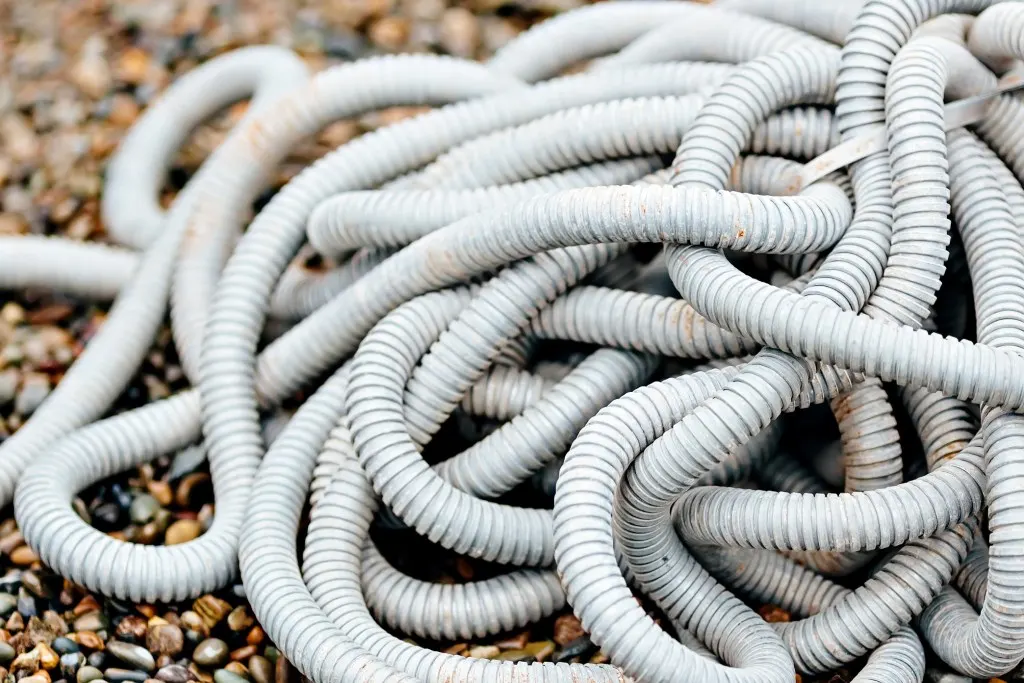When the winter season approaches, you may prepare to winterize your RV and put it away for the year. Or you may gear up for winter camping and be ready to deal with cold temperatures and snow. Perhaps you invest in RV skirting, install Reflectix, or reseal all your windows, vents, and doors.
If you haven’t considered protecting your water hose, don’t forget this crucial equipment. It’s time to get a heated hose for your RV to avoid waking up to a cracked water hose and a mess to clean up on a cold January morning. Let’s dive in!
What Is a Heated RV Hose?
When temperatures fall below freezing, a heated RV water hose will provide safe drinking water and ensure water moves freely through your hose and pipes without freezing.
These hoses should have food-grade, safe-drinking water materials. They’ll also be equipped with a thermostat or regulating function and insulation.

How Does a Heated RV Hose Work?
To use a heated hose, you need access to electricity. One end of the hose plugs into an outlet and sends electricity through the entire length of the hose. This electricity heats the hose so that when the water moves through it, it warms before entering the pipes of your RV. It also prevents the water from freezing inside the hose.
On the other hand, if you use a regular RV water hose during sub-freezing conditions, it’s likely the water inside the hose will freeze, thus cracking the hose. Water will get inside your RV after the hose bursts. Plus, you’ll be heading out to buy another RV water hose.
How Much Electricity Does One of These RV Hoses Use?
How much electricity a heated hose uses depends on the length and brand. A 50-foot hose will consume anywhere from 350-500 watts, while a 25-foot hose will consume about 150-300 watts.
This translates to two to five amps. When you don’t need the heated hose, it’s crucial to pack it away. Only use it when the temperatures are sub-freezing. You don’t want to leave a heated hose plugged in when not in use.

Can You Plug a Hose Into an Extension Cord?
It’s not a good idea to plug a heated hose into an extension cord. There are dangers associated with using extension cords with anything that produces heat.
However, if you use an extension cord, spend the money on a quality, heavy-duty option. It’s also crucial to choose a larger size than the hose cord since heat is continually transferring. Always use an extension cord with care.
Best Heated RV Hoses on the Market
A quality heated hose is worth investing in when you live or camp in sub-freezing temperatures. These three options vary in length, freeze protection, and price. You can choose the hose that works best for your needs.
Camco Heated Drinking Water Hose, – 20 F, 25-Foot
With over 12,000 ratings on Amazon, this Camco heated hose has over a four-star rating. This hose has the approval of consumers to back its varied options and regulations. It’s a trendy choice for RVers camping in sub-freezing temperatures during the winter.
It comes in 12-foot, 25-foot, and 50-foot options. This heated hose has two freeze protections: -20 degrees Fahrenheit and -40 degrees Fahrenheit. An energy-saving thermostat regulates the temperature, so the electrical heating wires don’t heat up unless necessary.
Bipeoo 15FT Heated Water Hose for Rv Antifreeze Drinking Garden Water Hose with Energy Saving Thermostat
A newer brand on the market is Bipeoo. This 15-foot heated hose has a freeze protection of -45 degrees Fahrenheit. Although it’s not solely for RVers, the hose is food-grade, lead-free, and BPA-free. It offers much for an affordable price.
The intelligent temperature sensing system is similar to the Camco thermostat, saving energy and money on electricity.
Giraffe Tools 5/8-inches Heated Drinking Water Hose with GFCI, Withstand Down to -20℉, 50 feet
This Giraffe Tools heated hose has GFCI protection to prevent overheating due to short circuits. Like the Bipeoo hose, this option has drinking water-safe material, so it is lead and BPA-free. It has a freeze protection of -20 degrees Fahrenheit and a 24-month warranty from Giraffe Tools.
This hose is a good option if you don’t mind spending a little extra on safety and security.
Are These RV Hoses Worth It?
It’s essential to protect your RV in cold weather conditions with a heated hose. If you don’t, it’s likely the water inside your pipes will freeze, and you’ll be dealing with severe consequences and repairs.
It’s worth paying $80-150 for a quality hose, so you’re not paying hundreds or thousands of dollars later. It also makes winter camping much more enjoyable and comfortable.
Rest easy knowing you’re protecting your water lines when winter camping with a heated hose. Will you be purchasing one soon?
Discover the Best Free Camping Across the USA
To be honest with you, we hate paying for camping. There are so many free campsites in America (with complete privacy).
You should give it a try!
As a matter of fact, these free campsites are yours. Every time you pay federal taxes, you’re contributing to these lands.
Become a FREE CAMPING INSIDER and join the 100,000 campers who love to score the best site!
We’ll send you the 50 Best Free Campsites in the USA (one per state). Access the list by submitting your email below: